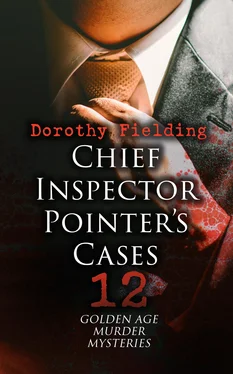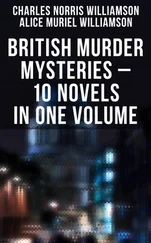Pointer settled himself for the night after a supper which made him turn pale for days to think on. He was well wrapped up, and with his legs on a second chair, did very well. Late in the night he heard some one come down the ladder and tiptoe into the room. It could only be Toni, for his mother was next door. From beneath his lashes, Pointer saw him in the moonlight creeping forward, his face distorted with timidity and anxiety. There was nothing in his hands. Pointer guessed what he was after. With the sigh of a sleeping man, he turned in his chair, so that his coat fell open—the photograph pocket in sight.
Toni crept closer. Tiny fingers, which again gave Pointer an odd thrill of physical repulsion which his mind did not share, touched him The photo was pulled out with a difficulty that to the detective was a certificate of the little fellow's previous honesty. Then Toni tiptoed to his mother's room. The door creaked slowly open and then shut. Followed a long whispered dialogue, during which Pointer took a nap. Ladine was not one of his accomplishments.
Back crept Toni. Half-way back went the photograph, then Pointer awoke and caught his wrist.
"A thief!"
"Oh, God!" Toni cried in fright. The door opened. His mother stood on the threshold holding a lamp high above her head with trembling hands. In the heavy folds of her nightdress and cap tied under her chin, she looked like a little white statue of fear.
"What does this mean?" Pointer asked as sternly as possible, for he felt as though he were terrifying two children, "I shall have to hand you over to the Carabinieri."
"I will explain." The mother came quite close. "No, Toni, let your mother explain. Only the truth is ever right. We must take the consequences. My son was having another look at a photograph you laid on the table this evening. It is of a relative? A friend?"
"One does not carry the pictures of strangers about with one. What do you know of the man?"
Again that agonised look exchanged between mother and son.
"Let go of my Toni, who did no harm except to listen to his mother's foolish, oh, foolish words! Now, we will all sit down, and I will tell you the dreadful truth."
"Mother, you will catch cold. Let me wrap a blanket around you." Toni rolled her up like a mummy, with only the wise little face showing.
"That man in the photograph came here just two weeks ago. On a Monday. The snows were hard and firm on the mountains then, and he had been here before. He had climbed with Toni the two last years in succession for a couple of days. Well, he came here in the afternoon, walking as you did from where the diligence put him down. He intended to stop the night and set off at four next morning, for the Val de la Saljeres , as we call it. A place which we here of Dla-ite avoid. The stones of an old watercourse are there. We Ladines know the truth of it, but you of the other people tell a different tale. This man—a sort of school-master like my blessed Antoni, he said he was—"
She paused inquiringly. Pointer nodded.
"Well, he wished to go there, and then go on later over to Meranoo by the Mendel. My son was willing. He liked the man. You did like him, didn't you, Toni?" She quavered, tears in her eyes.
"I did. He understood. He never laughed at the things we know."
"They set off in the morning about four, he and Toni, and by nine they should have been up in the Saijeres valley. But before twelve my Toni came running back. Happy Heaven! How he was running!" She undid a hand to wipe her eyes, but the tears were coming too fast now for her to speak. Toni patted the roll about where her shoulder would be.
"Tell no more, mother. I will show him everything to-morrow. I cannot explain in words as you can, but I will show him everything."
"Everything?" Again the two pairs of eyes clung
Toni swallowed and nodded. He was trembling violently. Pointer, with his purely physical dislike of him, thought again that it was not as a man trembles, but as an animal shivers.
"You will be ready in the morning at four? It will be wet, but the Val Saijeres lies low. It is only an uphill walk." Toni spoke quite resolutely.
"Good. I'll be ready. Now suppose we make your mother some tea or coffee."
But Toni poured into a saucepan some rough red wine mixed with water, dropped in a tablespoon of the black-brown honey of Tirol and some cloves, and stirred it all with a stick of cinnamon to a foamy froth This he poured into three cups. Pointer had tasted worse.
The old woman put her cup down with a shaking hand.
"It is a beautiful house, this of my husband's, but here in the valley there is only money. Happiness lies up on the hills." She left them.
Toni got up. "No, I will not speak now," he mumbled. "I am not good at talk like mother, but I will show you."
Pointer felt sure that he would be as good as his word, and fell into a sound sleep.
The old lady was astir with them next morning, heating up some of the buckwheat dumplings of their supper, and wrapping a couple in cabbage leaves for them to carry.
Toni took up his ice-axe with a strange look at its pointed tip. Then they set off by the swing of his lantern's light, and plodded on and up into a wild and stony region. True Dolomités were these, Lis Montes Palyes , Toni called them, and pallid and gray they were. Between this savage world the Saljeres Valley wound up, and up, with a prehistoric aqueduct at its upper end.
About eight, Toni, who had plodded along dumbly, stopped.
"We came here just like now, that man and I. Here he stopped to light his pipe, and said he would rest. I, too, sat down. On this rock here. My ice-axe I laid here. As I sat I heard a sound some way off. But this valley has so many invisible people living in it that I paid no heed. The mountain spirits do not harm me or any one in my charge. From this place a shorter way runs to the place he wanted to see, but we have had a very hard and late winter, and I was not sure whether the snow would not be too deep for him. He was not a young man. I asked him if I could climb up to that ridge there and look. If the path was open, we should be at the end of the gorge in a few minutes, but it would take me some twenty minutes to reach the rock. He said he wanted a rest, as his breathing showed. So I left my ice-axe where I had laid it beside him, and climbed that ridge you see to a little platform beyond, which you can't see. The track was deep in snow, as I thought. I was looking at it when suddenly I was told that something was wrong with the man. I ran back and I found him"—Toni began to tremble, that animal shuddering that seemed to crinkle his very skin—"I found him—around this bend. Here, on this new place. He must have moved into the sun when I had gone. But I found him—dead. Lying back with his head this way, and my ice-axe here beside him. Its point was red, and his head was red. There was a deep hole in it on top. He was quite dead. Some one had killed him with my ice-axe while I was away, and some one had robbed him of everything in his pockets, even to his handkerchief. I looked because I did not know his name. He had come two years, but there was no need of names. I rushed up that ridge there to see, but I saw nothing I shouted, but though a man over there heard me, he was a Croderes, and they never come. I was frightened—my man, my axe, and everything stolen from him—I lifted him into a cave I know of close to here. You see that stone?"
Pointer nodded with tense jaw.
"It rolls away. Behind it is a cave, dry and ice-cold. Ice-water washes around it. I put him in there, and ran home and told mother. She was as frightened as I, and it takes a lot to frighten mother"—Pointer thought of the little white-faced wisp, and smiled to himself—"and we decided to leave him there and say nothing. He is there now, and that is why I waited every day in Bolzano. I knew that some one would come looking for him. This is the rock."
Читать дальше












